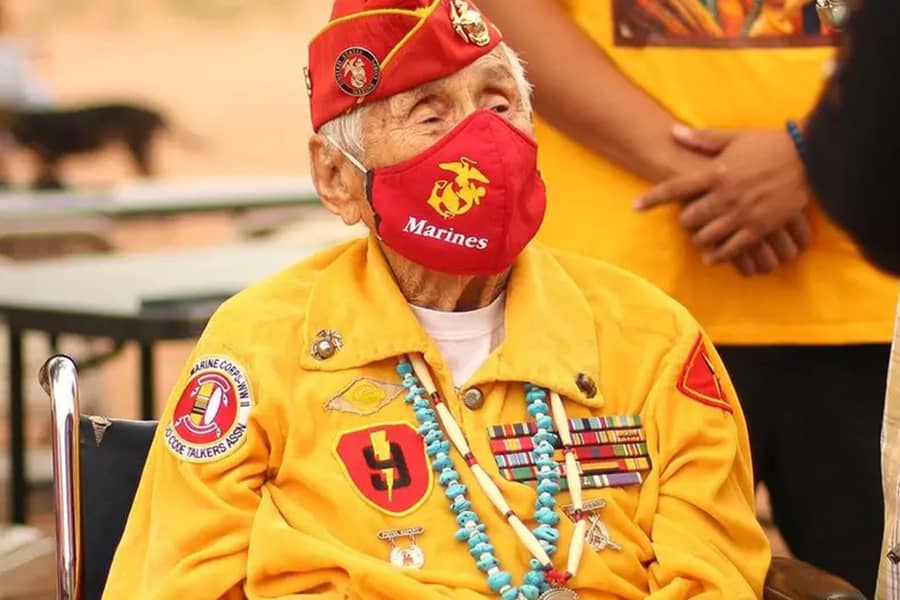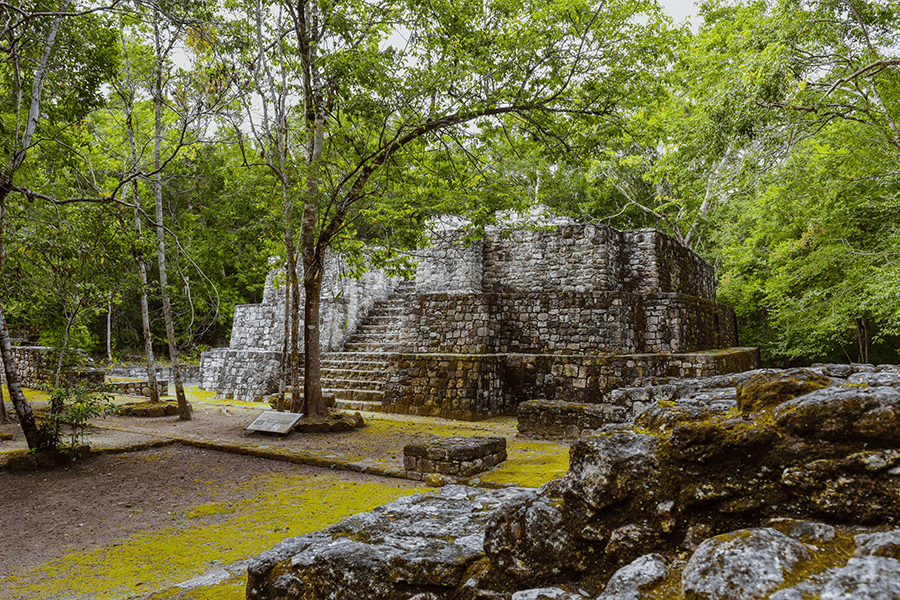John Kinsel Sr., a Navajo Code Talker who served during World War II, has passed away at the age of 107.

Honoring John Kinsel Sr.’s Legacy
John Kinsel Sr.’s legacy extends far beyond his remarkable role as a Navajo Code Talker. His life was a testament to the resilience and ingenuity of Indigenous peoples, showcasing how cultural heritage could be harnessed in service to a nation during one of its most challenging times. Kinsel’s contributions were not merely tactical; they embodied the spirit of unity and determination that defined an era. Through innovation born from tradition, he transformed a language into an unbreakable code that confounded enemy forces and played a pivotal role in securing victories across the Pacific Theater.
As we reflect on his extraordinary journey, it becomes clear that honoring John Kinsel Sr. means recognizing both his military achievements and the rich cultural tapestry he represented. He was more than just a soldier; he was a bridge between worlds—the ancient wisdom of Navajo customs and the modern principles of warfare. In preserving and promoting the Navajo language under such pressure, Kinsel ensured that future generations would not only remember his bravery but also embrace their identity with pride. This dual legacy prompts us to consider how we can foster understanding between diverse cultures today, drawing inspiration from Kinsel’s unwavering commitment to both community and country.
Early Life and Navajo Heritage
John Kinsel Sr.’s early life was deeply intertwined with the rich tapestry of Navajo culture, which instilled in him a profound sense of identity and resilience. Growing up in the vast expanse of the Navajo Nation, he was surrounded by storytelling traditions that not only connected him to his ancestors but also taught vital skills for survival and communication. These narratives often spoke of bravery and eloquence—qualities that would define his role as a Code Talker during World War II.
The teachings passed down through generations emphasized the importance of language, an intrinsic part of Kinsel’s heritage that would later serve a greater purpose on the battlefields. The Navajo language, with its complex syntax and tonal nuances, became an impenetrable code for military communications—a testament to both its beauty and practicality. Kinsel’s fluency in his native tongue allowed him to play an indispensable role in clandestine operations, showcasing how cultural heritage can be transformed into powerful tools when honorably utilized for national service. His legacy extends beyond bravery; it embodies a celebration of indigenous strength that continues to inspire future generations within Native American communities and beyond.
Enlistment in World War II
Enlistment in World War II was not merely a call to arms; it was an awakening of identities that redefined courage and sacrifice. For many, like John Kinsel Sr., joining the military meant stepping away from traditional roles within their communities, embracing not just the chaos of war but also a profound sense of purpose. This era saw diverse groups, particularly Native American tribes, contribute uniquely to the war effort, with individuals stepping forward to serve in ways that transcended conventional expectations. They were not just soldiers; they were guardians of culture and linguistic heritage.
The Navajo Code Talkers exemplified this dynamic interplay between identity and duty. By using their native language as an unbreakable code, they not only thwarted enemy efforts but also raised awareness about Indigenous contributions during a pivotal historical moment. Their enlistment was symbolic—a reclamation of agency amid impending global conflict—and resonated deeply within their communities long after the guns fell silent. In celebrating figures like Kinsel Sr., we recognize how each enlistment shaped collective narratives around bravery that extended beyond the battlefield into significant cultural legacies that continue to inspire generations today.
Role as a Code Talker
As a Code Talker, John Kinsel Sr. played a pivotal role in World War II by utilizing the unique Navajo language to create an unbreakable code that confounded enemy forces. His ability to speak this complex language fluently enabled him to transmit vital military messages in real time, making him an unsung hero on the battlefield. The brilliance of this approach lay not only in the linguistic intricacies but also in its cultural significance; Kinsel and his fellow Code Talkers transformed their ancestral tongue into a formidable weapon against oppression.
Beyond tactical advantages, Kinsel’s legacy as a Code Talker illuminates a deeper narrative about identity and resilience. In the face of systemic racism and marginalization, these indigenous warriors showcased how culture can triumph over adversity. Their contributions were so critical that they shifted perceptions of Native American capabilities during wartime—paving the way for increased recognition and respect long after the war ended. Ultimately, Kinsel’s journey serves as a powerful reminder that history is often shaped not just by grand events but also by the quiet courage of individuals who dare to redefine their roles amidst turmoil.
Contributions to Military Communications
John Kinsel Sr.’s remarkable contributions as a Navajo Code Talker during World War II highlight the profound impact of cultural heritage on military communications. Utilizing the complexity and nuance of the Navajo language, Kinsel and his fellow code talkers crafted an unbreakable code that played a pivotal role in securing American victories across pacific battlefields. Their use of an indigenous dialect not only provided a tactical advantage but also showcased how linguistic diversity can serve as a strategic tool in modern warfare.
The legacy left by Kinsel extends beyond the battlefield, intertwining with narratives of resilience, pride, and innovation among Native American communities. As technology continues to advance, understanding historical methods of communication like those employed by Kinsel encourages contemporary dialogue about cybersecurity and information warfare. In an era when information security is paramount, revisiting these foundational strategies offers unique insights into adapting cultural knowledge for modern applications—a testament to the enduring power of language and identity in shaping history’s trajectory.
Post-War Life and Achievements
Post-war life for John Kinsel Sr. was a remarkable journey marked by his unwavering commitment to his community and heritage. After returning from the war, Kinsel utilized his experience as a Navajo Code Talker to advocate for the rights of Native Americans, emphasizing the importance of language preservation and cultural identity. He became an inspiring figure in the fight for recognition of Indigenous contributions, engaging with local schools and organizations to promote education about Navajo history and traditions.
Kinsel’s achievements extended far beyond activism; he dedicated himself to serving others through various leadership roles within tribal governance and veteran organizations. His efforts helped bridge gaps between communities, fostering understanding and respect through storytelling that linked past struggles with present aspirations. Even in his later years, Kinsel remained a living testament to resilience, grace, and the enduring spirit of service—proving that true valor transcends battlefield heroics into a lifelong dedication to uplifting those around you. As we reflect on his legacy, we are reminded that honoring our roots while paving new paths is vital for future generations.
Advocacy for Native American Rights
John Kinsel Sr.’s remarkable life as a Navajo Code Talker illustrates the broader struggle for Native American rights, a fight that continues to echo in contemporary society. While his incredible contributions during World War II showcased the intelligence and resilience of Indigenous peoples, they also highlight the persistent issues of cultural preservation and recognition that Native Americans face today. The legacy of the Code Talkers goes beyond military valor; it serves as a symbol of resistance against erasure and misrepresentation.
Advocacy for Native American rights is crucial in fostering gratitude and respect for their unique heritage, especially as communities grapple with historical injustices and ongoing socioeconomic challenges. Organizations dedicated to this cause work tirelessly to ensure that Indigenous voices are heard in policy-making arenas where decisions about land, education, health care, and sovereignty are made. As we reflect on Kinsel’s life, it becomes imperative to recognize that honoring such heroes means amplifying the struggles they symbolize—pushing for systemic change while honoring the rich cultures that continue to thrive despite adversity.
Moreover, engaging with Native American narratives through education can dismantle stereotypes and promote understanding among diverse populations. Efforts like integrating historical accounts into school curricula or supporting Indigenous media initiatives can help bridge gaps between cultures. In celebrating figures like John Kinsel Sr., we not only pay tribute to individual bravery but also reaffirm our collective responsibility toward justice and equality for all Indigenous people—a commitment that should resonate long after such legends have passed.
Reflections from Family and Friends
As the news of John Kinsel Sr.’s passing echoes through the Navajo community and beyond, his family and friends reflect not just on a life lived, but on a legacy carved in courage and resilience. Those close to him remember more than just his service as a Code Talker during World War II; they recall the warmth of his laughter, the strength in his stories, and the wisdom he imparted over countless gatherings. His family notes how he seamlessly wove ancestral knowledge into their lives, teaching younger generations about their culture’s value while instilling pride in their heritage.
Friends share anecdotes that highlight Kinsel’s humility despite his monumental contributions—a man who preferred to lift others up rather than seek accolades for himself. They fondly reminisce about evenings spent under the vast New Mexico sky, where he would recount tales of bravery with an infectious enthusiasm that inspired all who listened. For many, Kinsel personified resilience born from struggle; overcoming adversity came naturally to him, and this spirit became a beacon for those navigating their own challenges—a testament to both his character and lasting impact on everyone fortunate enough to know him.
Impact on Future Generations of Codetalkers
The legacy of John Kinsel Sr. and his fellow Navajo Code Talkers resonates far beyond their remarkable contributions during World War II; it reverberates through the generations that follow. As these brave men utilized their native language to create an unbreakable code, they not only helped secure victory for the United States but also forged a deeper recognition and appreciation of indigenous cultures. Future generations of Navajo youth are inspired by these stories, instilling a sense of pride in their heritage while encouraging them to explore fields like linguistics, technology, and cultural preservation.
Moreover, the significance of the Code Talkers extends into modern discussions around identity and representation. The growing narrative surrounding Indigenous peoples in media and education acknowledges their pivotal role in U.S. history, challenging stereotypes and fostering understanding among diverse communities. By embracing Kinsel’s story as part of a larger dialogue about resilience, innovation, and service, young people can find new pathways for activism—celebrating cultural uniqueness while advocating for social justice. The impact on future generations transcends mere remembrance; it empowers youth to stand tall against challenges with the knowledge that they carry forward a rich legacy rooted in courage and ingenuity.
Remembering a Remarkable Life
John Kinsel Sr.’s legacy reaches far beyond the battlefield; it embodies a remarkable convergence of culture, resilience, and patriotism. As a Navajo Code Talker during World War II, Kinsel was not merely a soldier; he represented an unyielding spirit that encapsulated the strength of Indigenous identity in the face of adversity. His ability to communicate crucial military strategies through his native language forged an integral part of American history, exemplifying how cultural heritage can be wielded as a potent tool for unity and defense.
Reflecting on Kinsel’s life reveals the profound impact one individual can have on countless lives. Beyond his military service, he devoted himself to educating future generations about the significance of Navajo culture and history. His narrative serves as a vital reminder that valor isn’t only measured by acts of bravery in wartime but also by commitments to foster understanding and appreciation between cultures. Through storytelling sessions and community engagements, Kinsel kept alive both the memory of those who fought alongside him and their shared commitment to preserving their language—a testament to resilience—becoming an inspiration for many who continue this legacy today.
The story of John Kinsel Sr. resonates with each passing generation; it challenges us to reflect on our own identities while celebrating diversity within our shared human experience. As we remember him, let us honor not only his extraordinary achievements during war but also his enduring contributions as a custodian of culture—reminding us all that true heroism lies in bridging divides and nurturing connections across cultures for generations yet unborn.




